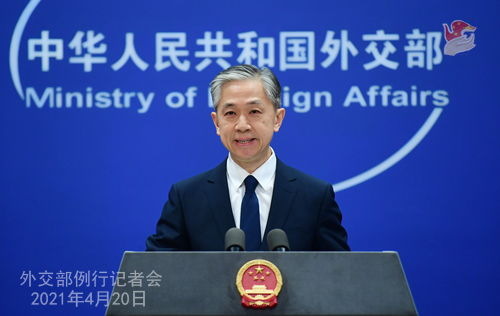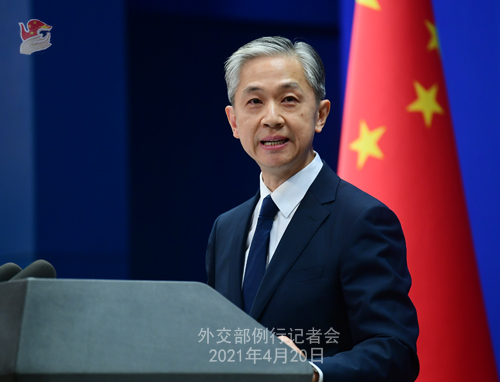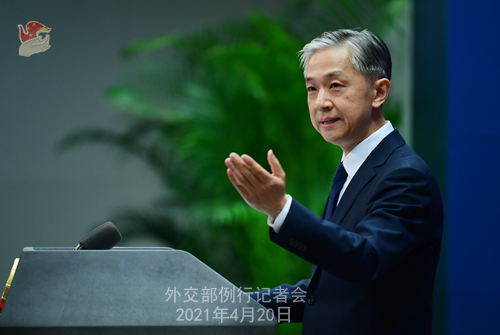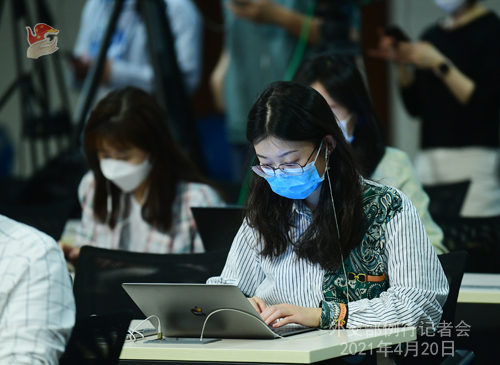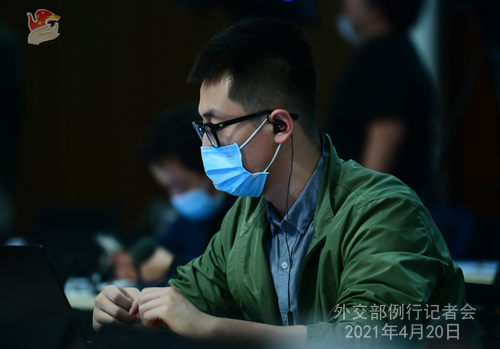| Foreign Ministry Spokesperson Wang Wenbin's Regular Press Conference on April 20, 2021 |
| 2021-04-20 21:37 |
|
CCTV: This morning, Chinese President Xi Jinping delivered a keynote speech via video link at the opening ceremony of the Boao Forum for Asia (BFA) Annual Conference 2021. There were a lot of important messages in his speech. Could you tell us a bit more? Wang Wenbin: This year's Boao Forum for Asia (BFA) Annual Conference is the first large-scale international conference held mostly offline amid the COVID-19 epidemic, drawing widespread attention worldwide. At the opening ceremony this morning, President Xi Jinping delivered a keynote speech titled "Pulling Together Through Adversity and Toward a Shared Future for All", in which he elaborated on China's visions and proposals to strengthen global governance in the context of the COVID-19 epidemic and other major changes unseen in a century. It is of great significance for enhancing confidence and building up consensus to lead countries in Asia and beyond to defeat the virus and embrace a better future. In his speech, President Xi put forward four proposals on joining hands to fight the epidemic, strengthening global governance and promoting the building of a community with a shared future for mankind: We need consultation on an equal footing to create a future of shared benefits. We need openness and innovation to create a future of development and prosperity. We need solidarity and cooperation to create a future of health and security. We need commitment to justice to create a future of mutual respect and mutual learning. President Xi stressed that world affairs should be handled through extensive consultation, and the future of the world should be decided by all countries working together. We must not let the rules set by one or a few countries be imposed on others, or allow unilateralism pursued by certain countries to set the pace for the whole world. What we need in today's world is justice, not hegemony. In this age of economic globalization, openness and integration is an unstoppable historical trend. Attempts to "erect walls" or "decouple" run counter to the law of economics and market principles. They would hurt others' interests without benefiting oneself. It is also important that we take comprehensive measures to improve global governance on public health security and work together for a global community of health for all. We must reject the cold-war and zero-sum mentality and oppose a new "Cold War" and ideological confrontation in whatever forms. We must advocate peace, development, equity, justice, democracy and freedom, which are common values of humanity. President Xi announced that once the pandemic gets under control, China will host the second Conference on Dialogue of Asian Civilizations. President Xi's speech carries great significance and helps guide countries to work together to address major crises and challenges facing mankind, and promote a more equitable and fair system of global governance, which was warmly received among all parties. President Xi pointed out in his speech that Belt and Road cooperation pursues development, aims at mutual benefits, and conveys a message of hope. Going forward, we will continue to work with other parties in high-quality Belt and Road cooperation. We will follow the principles of extensive consultation, joint contribution and shared benefits, and champion the philosophy of open, green and clean cooperation, in a bid to make Belt and Road cooperation high-standard, people-centered and sustainable. We will build a closer partnership for health cooperation, connectivity, green development, and openness and inclusiveness. This has chartered course for and lent impetus to BRI international cooperation, which is welcomed by all parties. It is believed that with the active participation of all parties, this year's BFA Annual Conference will achieve fruitful results and make positive contributions to helping countries in Asia and beyond step out of the doldrums and achieve economic recovery and development. Reuters: There have been reports that the land border between North Korea and China has reopened and we've seen increasing trade. I wonder if the ministry can confirm whether that's the case or give us any information when it might expect North Korea to ease restrictions and allow trade at the land border with China? Wang Wenbin: China and the DPRK are friendly, close neighbors that have a demand for normal economic and trade exchanges. China respects DPRK's anti-epidemic measures and is ready to enhance exchanges and cooperation across the board with the country on the basis of ensuring safety in the context of COVID-19. China Review News: On May 19, the New Zealand Foreign Minister Nanaia Mahuta delivered a speech at the New Zealand China Council, saying that the New Zealand-China comprehensive strategic partnership has been developing very well and the relationship with China is one of the most important bilateral relationships for New Zealand. New Zealand has always adhered to the one-China policy and the two sides enjoy great potential for cooperation in many areas, including economy, agriculture, optimization of business environment and multilateral and regional cooperation. The New Zealand side seeks to manage relations between the two countries in a consistent and predictable manner through diplomatic channel and with dialogue. At the same time, the government will speak out on issues such as Xinjiang, Hong Kong and cyber security when necessary. What is China's comment on that? Wang Wenbin: We noted relevant reports and appreciates the fact that the New Zealand government attaches importance to and commits itself to developing bilateral relations. China and New Zealand are each other's important cooperative partners. Over the past 49 years since the establishment of diplomatic ties, China-New Zealand relations have made considerable progress and many "firsts" have been created in our cooperation. Under the new circumstances, China is ready to make joint efforts with New Zealand to carry forward the spirit of "striving to be the first", strengthen dialogue, deepen cooperation, rise above distractions and work for greater development of China-New Zealand comprehensive strategic partnership. In the meantime, I would like to point out that China is firmly determined to safeguard its sovereignty, security and development interests. We are always firmly opposed to other countries using the so-called Hong Kong, Xinjiang and other issues to interfere in China's internal affairs, and opposed to groundless accusations against China on cyber security and other issues.
NHK: It is reported that Tokyo Metropolitan Police Department decided today to investigate a Chinese male in his 30s who is suspected of renting server used by Chinese military in cyber-attacks. What's your comment? This man is believed to have left Japan. If Japan files an application for verification to China, will China provide assistance? Wang Wenbin: I am not aware of the situation you mentioned. Global Times: French writer Maxime Vivas said in a recent interview that he has been harassed and verbally abused by social media users after publishing the book titled Uyghurs: To Put an End to Fake News, but there is less and less allegations of "refugee camp" and "genocide" in Xinjiang in French media reports. Do you have any comment? Wang Wenbin: I noted relevant reports. When certain Western politicians and media are frantically spreading lies on Xinjiang, some righteous people have stepped forward to tell the truth and expose Xinjiang-related lies and the conspiracy behind the lies. Maxime Vivas is one of them. In his book titled Uyghurs: To Put an End to Fake News, he tells people with his first-hand experience that there is not any so-called "concentration camp" in Xinjiang, and the allegation of "genocide" is more than preposterous. Besides Vivas, the South China Morning Post also pointed in its recent article "Xinjiang: what the West doesn't tell you about China's war on terror" that it is actually quite remarkable that China has been able to rein in terrorism, an intractable problem anywhere in the world, without inflicting as much collateral damage like the US. This is rare in the world, but this point never seems to be made in the torrent of outrage pouring from the Western press. US website The Grayzone and the Australian Citizens Party's publication the Australian Alert Service also published articles to explain the real situation in Xinjiang. Mr. Vivas said in the interview that he had been subjected to pressure from the public opinion and society and even threats for presenting the real situation in Xinjiang. We want to give him a thumbs-up for his courage to reveal the truth and hope more people will cheer him on. Prejudice cannot endure and rumors are doomed to fall apart. We believe that more and more people will get to know the real situation in Xinjiang. The Paper: It is reported that some in Japan said that since China and the Republic of Korea (ROK) adopt much lower standards than Japan on the disposal of wastewater from nuclear power plants, it makes no sense that China and the ROK criticize Japan on the issue from a scientific perspective. Do you have any comment? Wang Wenbin: Relevant remarks by the Japanese side are a distortion of concepts aimed at diverting attention. They run counter to science and are extremely irresponsible. I must stress that contaminated water from Fukushima nuclear accident is in essence different from the water discharged from the normal operation of nuclear power plants. First, they are different in source. Water discharged from the normal operation of nuclear power plants follows common international standards. It is released in an organized way after treatment and test for compliance with standards. It is not radioactive wastewater. This is proved to be safe and controllable after years of practice by nuclear power plants worldwide. The Fukushima nuclear accident is the highest-level nuclear accident. The contaminated water is composed of cooling water injected into the melted reactor core, as well as groundwater and rainwater. It consists large amounts of radioactive isotopes which are created in the fission process and non-existent in nature. There is no precedent to refer to and the impact on marine environment and public health cannot be neglected. Second, they are different in the level of treatment difficulty. Water discharged from the normal operation of nuclear power plants follow common international standards. It is released in an organized way after treatment and test for compliance with standards. It is not radioactive wastewater. The contaminated water from Fukushima nuclear accident needs to be purified with the Advanced Liquid Processing System (ALPS), a multi-nuclide removal system, but whether the treated water will be up to standards needs to be verified. A report released by the Subcommittee on Handling of the ALPS Treated Water on February 10 last year shows that 73% of the contaminated water treated by the ALPS exceeds Japan's standards for discharge by December 31, 2019. According to data released by the Tokyo Electric Power Company (TEPCO), the activity and density of iodine-129 in the contaminated water exceeded standards for many times even after filtered through ALPS. The US journal Science, one of the world's most authoritative academic journal, carried an article on April 13 pointing out that more dangerous isotopes with longer radioactive lifetimes, such as ruthenium, cobalt, strontium, and plutonium, sometimes slip through the ALPS process. A big question mark should be placed on whether Japan can ensure long-term, stable operation of the treatment process. Japan had proposed five ways to dispose of the contaminated nuclear water: release as hydrogen gas into the atmosphere, injection into geosphere layers, underground burial, vapor release and discharge into the ocean. Japan has not reached any consensus through consultation with the rest of the international community and the stakeholders. Neither has it tried all means for safe disposal. Under such condition, citing limited storage space at the site and for self-interest, Japan has unilaterally opted for discharge into the sea as it costs the least to its economy. However, by doing so, it has presented the biggest environmental health and safety risk to the world and shifted its own responsibility to all mankind, which is a highly irresponsible act. What Japan should do now is stop misleading the public with pseudoscience. Instead, it should take a truly science-based attitude, face up to the doubts and objections of the international community, earnestly fulfill its international obligations, correct its unilateral wrong decision to dispose of the contaminated water from Fukushima nuclear accidents by dumping it into the sea, and take concrete actions to win the trust of neighboring countries and the international community. Bloomberg: US Secretary of State Antony Blinken laid out in a speech on Monday how Washington plans to adjust its foreign policy to reflect goals for dealing with climate change. He said the US is falling behind China in seizing opportunities created by climate change but also said the Biden administration won't let other countries get away with bad practices such as human rights abuses because they're making progress on curbing climate change. What's the Foreign Ministry's comment? Wang Wenbin: First of all, I'd like to point out that I stated China's position on the human rights issues yesterday. What the US should do is earnestly reflect on its own wrong behaviors violating human rights in other countries, rather than meddling in other countries' domestic affairs under the pretext of human rights. To answer your question on tackling climate change, the international community has witnessed China's actions and outcomes in tackling climate change. As to who is making contributions with concrete actions and who is seeking selfish interests through empty talk, the world has its fair conclusion. We hope the US will find its right place, come back to compliance with international law and multilateralism, pool strength globally and encourage broad participation to jointly tackle global environmental crisis.
Reuters: I want to ask about the Human Rights Watch report released yesterday that said China's actions in Xinjiang met the criteria for crimes against humanity as defined by the International Criminal Court. What's the ministry's comment on that? Wang Wenbin: The so-called "human rights organization" you mentioned has always been full of prejudice and engaged in misleading the public. The relevant report is pure slander. We have talked on many occasions about Xinjiang's overall social stability, economic and social development and people living a happy life there. The accusation of "genocide" and "crimes against humanity" are lies of the century concocted by certain Western countries and anti-China forces. Their goal is to put restriction and crack down on relevant sides and companies in China, undermine stability and security in Xinjiang and contain China's development. The accusation of the so-called "Uyghurs detained in Xinjiang" is also false. Certain organizations have spread relevant fallacies based on lies and disinformation concocted by anti-China forces, out of prejudice against China and for political purposes. We are firmly opposed to and totally reject their groundless accusations and slanders. Not long ago, the Secretary-General of Shanghai Cooperation Organization and ambassadors and diplomats from 21 countries visited Xinjiang. Through first-hand experience and what they've seen and heard on the ground, they believed that the Western anti-China forces' smears against Xinjiang are groundless, and they understand and support Xinjiang's counterterrorism and deradicalization effort, appreciates Xinjiang's stability, unprecedented economic progress and prosperity. At the 46th session of the UN Human Rights Council, more than 80 countries supported China's position on Xinjiang-related issues in different ways. Some organizations and media have turned a deaf ear to the authoritative information provided to them by the Chinese government on many occasions, and acted as the "mouthpiece" and "amplifier" of lies and disinformation. This seriously violates the principles of impartiality, objectivity and non-selectivity. We welcome foreign friends with fair and objective view to visit Xinjiang and other places in China. What we oppose is the so-called "investigation" based on presumption of guilt and fabrication of lies with attempt to smear China. We hope that the parties concerned will respect the facts and truth, shake off ideological bias, and stop spreading false information and fallacies. Kyodo News Agency: At the 46th session of the UN Human Rights Council, how many countries supported China on issues related to Xinjiang and Hong Kong? Can you give us a specific figure? In addition, how many countries are against China on these issues? Wang Wenbin: During the recently concluded 46th session of the UN Human Rights Council, a total of 64 countries issued a joint statement to support China's policies in Xinjiang and 71 countries expressed support to China in another joint statement on Hong Kong-related issues. If you want more details, I'd refer you to the secretariat of the UN Human Rights Council. Xinhua News Agency: The chief executive of Serum Institute of India, Adar Poonawalla, said he hopes the US will lift the embargo of raw material exports out of the US, so that vaccine production can ramp up. The head of WHO, Tedros Adhanom Ghebreyesus, said the world can bring the global COVID-19 pandemic under control in the coming months provided it distributes the necessary resources including vaccine fairly. Do you have any comment? Wang Wenbin: According to statistics, the US is currently the world's second largest producer of COVID-19 vaccines, but very few of its vaccines have been exported. The US news website Axios said "Billions of people around the world are waiting impatiently for access to a COVID-19 vaccine. But 30 million doses of vaccine are sitting in Ohio, gathering dust." The widening of the "vaccine divide" will harm the interests of all mankind. When developing countries are struggling with the epidemic, how can the US remain safe and sound? We should uphold fairness and justice by making vaccines available and affordable to the people of developing countries and providing assistance to countries and regions vulnerable to the epidemic. We call on the international community to work together to make vaccines a global public good, promote equitable distribution and use of vaccines around the world, and strive for an early victory over the epidemic. We also urge the US to shoulder its due international responsibilities.
Bloomberg: I'd like to refer to an earlier question from my colleague from NHK. My question is similar, but not the same. Japan's NHK has reported that China's military instructed a hacker group to conduct cyber attacks on nearly 200 Japanese research institutions. What's the Foreign Ministry's comment on this? Wang Wenbin: We have taken note of the report. As China has always underscored, given the virtual nature of cyberspace and the fact that there are all kinds of online actors who are difficult to trace, it's important to have ample evidence when investigating and identifying cyber-related incidents. China firmly opposes attempt by any country or institution to sling mud at China under the pretext of cyber attacks, or exploit cyber security issues to serve its political purposes. I want to emphasize that cyber hacking is a common challenge faced by all countries. According to the report of the National Computer Network Emergency Response Technical Team/Coordination Center of China (known as CNCERT/CC), in February this year alone, 830,000 computers with IP addresses in China were controlled by 8,734 Trojans or zombie programs, 70% of which came from abroad. China is ready to strengthen dialogue and cooperation with all parties to jointly address cyber security threats. China News Service: According to a Dutch consultancy report, Huawei may have eavesdropped on phone conversations of Dutch telecom provider KPN's users without KPN's knowledge. In response, KPN said the report was compiled for the purposes of risk analysis and never confirmed that Huawei had monitored any of its mobile users or acquired data. Huawei's office in the Netherlands said that Huawei employees don't have access to KPN's network and data. Do you have any comment? Wang Wenbin: We have noted relevant reports and noticed that KPN and Huawei both made clarifications in response. Relevant accusations targeting Huawei cannot hold water. For quite some time, we've seen many groundless accusations and smearing against Chinese companies. This phenomenon merits some deep thinking and calls into question the true intention behind it. In the past 30 years, Huawei has developed over 1,500 networks in more than 170 countries and regions, having 228 Fortune 500 companies as clients and serving more than 3 billion people all over the world. There was not a single cybersecurity incident, tapping or surveillance operation. Huawei has long publicly expressed its readiness to sign a "no back door" agreement and to set up a cyber security assessment center in any country to receive external scrutiny. So far, no other company has ever made the same commitment and no company or individual has ever provided any confirmed evidence to prove that Huawei is a security threat. Some countries and individuals, by using the so-called national security and ideology as pretexts, groundlessly accuse Chinese companies of data theft. They have even gone so far as to concoct lies to defame and smear Chinese companies. This is how they suppress competitors in an attempt to uphold their own monopoly. Countries should boycott discrimination against other countries in the science and technology sector with the same efforts in opposing racial discrimination, uphold fair competition and market principles, abide by international economic and trade rules and provide a fair, just and non-discriminatory business environment for all companies.
|
| |||||||||||||||
|
|||||||||||||||


